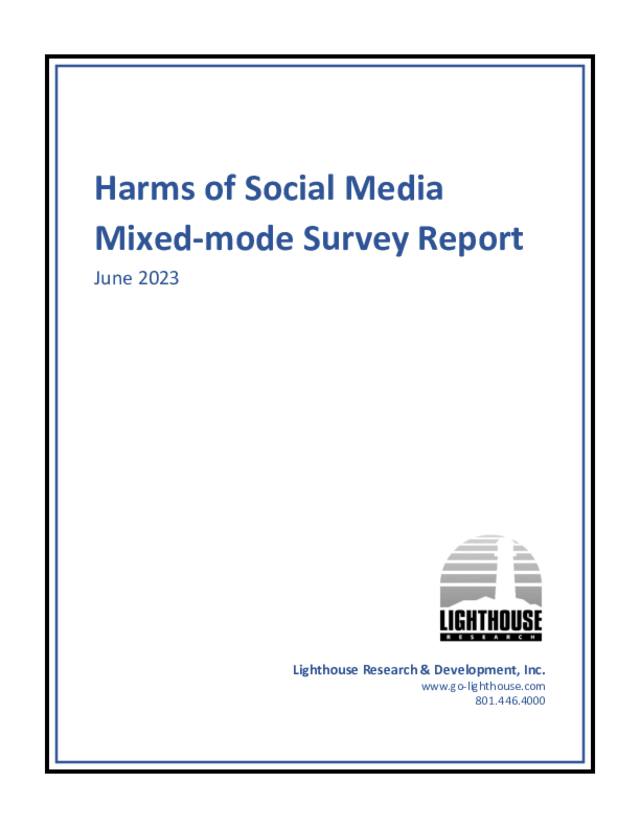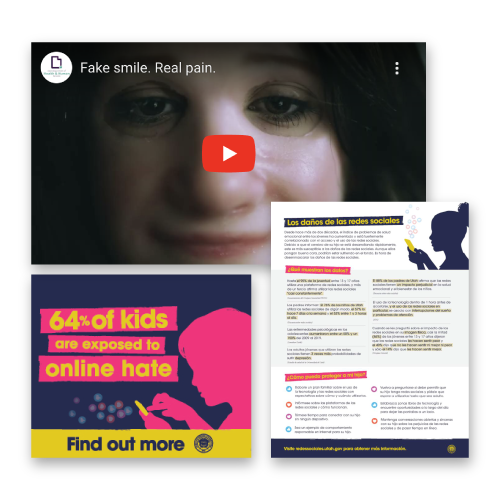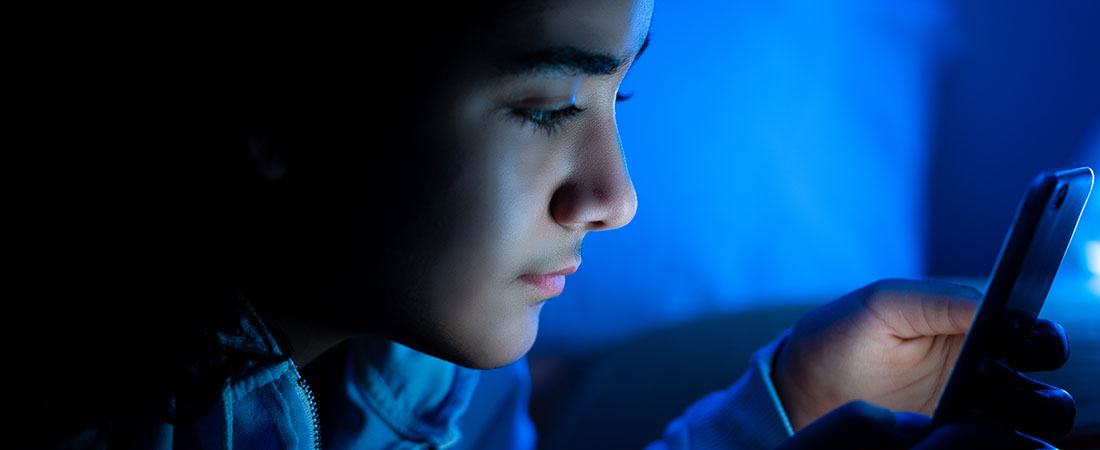Social media can connect us to a world of opportunities, but what if it’s harming our children?
Your child’s brain is developing rapidly, making them more susceptible to the harms of social media. And though they might put on a brave face, they could be hurting underneath. It’s time to unmask the harms of social media.
There is growing concern for children and teens using social media. Social media can be incredibly harmful for youth. Kids need less screen time for healthy growth and development. We can work together to establish social media boundaries, model healthy social media use, and teach children how to use it safely.
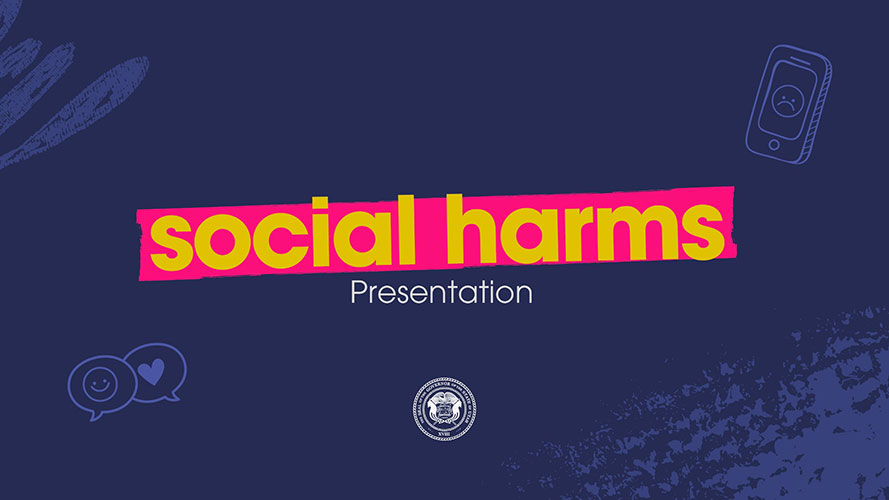
The harms of social media
Teens who spent more than 3 hours per day on social media faced double the risk of experiencing poor mental health outcomes.
Nearly half of teens ages 13 to 17 said using social media makes them feel worse.
Almost 60% of teenage girls say they’ve been contacted by a stranger on social media platforms in ways that make them feel uncomfortable.
According to a survey of 8th and 10th graders, the average time spent on social media is 3.5 hours per day and almost 15% (1 in 7) spends 7+ hours per day on social media.
Excessive social media use has been linked to sleep problems, attention problems, and feelings of exclusion among teenagers.
In a review of 36 studies, a consistent relationship was found between cyberbullying on social media and depression among children of all ages.
In a national survey of girls ages 11 to 15, one-third or more say they feel “addicted” to a social media platform.
More than half of teens report that it would be hard to give up social media.
Screen Time Limits for Young Children
The American Academy of Pediatrics (AAP) recommends the following screen time limits for infants and children
- 0 to 18 months old: No screen time except for video chatting (FaceTime, Zoom, WhatsApp) with other people your child knows (like a grandparent).
- 18 to 24 months old: Keep screen time limited (less than 1 hour each day) and watch high-quality children’s programs with your child. They learn best when you watch with them and explain what they’re watching. High-quality programs are:
- Age appropriate. The content was designed to be easily understood by young children by developmental experts.
- Interactive. The content encourages children to sing along, name a color, move around, or do something else active.
- Educational. The content teaches about emotions, feelings, letters, numbers, or other topics.
- 2 to 5 years old: Keep screen time to 1 hour a day. Your child still learns best when you watch with them and apply what they see to the world around them.

6 years and older: Place consistent limits on the time spent using media, and the types of media. Make sure screen time does not take the place of adequate sleep, physical activity, and other behaviors that keep kids healthy. See Recommended Screen Time
Share this message with others
What do Utah parents think about social media?
It can be scary and intimidating raising kids in a world filled with technology—predators, inappropriate content, bullying, and a distorted reality are just some of the concerns you might have. But you’re not alone! We asked Utah parents what they thought about social media, its effects on their children, and what they’re doing to help protect their kids.
- 88% believe social media has a detrimental impact on children and youth.
- 63% were concerned about social media impacting their child’s mental health.
- 60% were concerned about social media impacting their child’s body image.
- 94% enforce boundaries with their children’s social media usage, like enforcing time limits, content restrictions, and setting age limits.
- 84% encourage their children to unplug from social media and participate in other activities.
What can you do to protect your child?
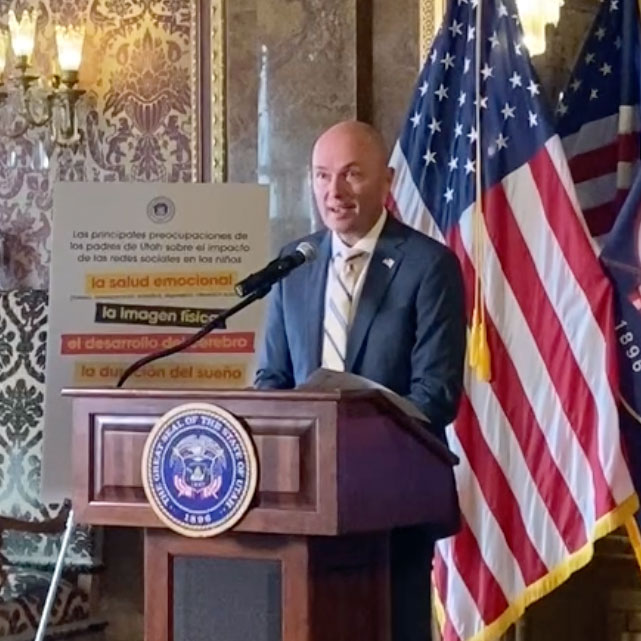
Reconsider allowing your child to have social media and encourage them to wait to use it until they are an adult.
Governor Spencer J. Cox
- Create a family media plan.
Agreed-upon expectations can help establish healthy technology boundaries at home – including social media use. A family media planopens in a new tab can promote open family discussion and rules about media use and include topics such as balancing screen/online time, content boundaries, and not disclosing personal information. - Create tech-free zones and encourage children to foster in-person relationships.
Electronics can be a distraction after bedtime and can interfere with sleep. Consider restricting the use of phones, tablets, and computers for at least 1 hour before bedtime and through the night. Keep family mealtimes and in-person gatherings device-free to build social bonds and engage in a two-way conversation. Help your child develop social skills and nurture his or her in-person relationships by encouraging unstructured and offline connections with others and making unplugged interactions a daily priority. Learn more from the American Academy of Pediatricsopens in a new tab. - Model responsible social media behavior.
Children often learn behaviors and habits from what they see around them. Parents can set a good example of what responsible and healthy social media use looks like by limiting their own use and being mindful of social media habits.
- Teach kids about technology and empower them to be responsible online participants at the appropriate age.
Discuss with children the risks of social media as well as the importance of respecting privacy and protecting personal information in age-appropriate ways. Have conversations with children about who they are connecting with, their privacy settings, their online experiences, and how they are spending their time online. Encourage them to seek help should they need it. Learn more from the American Academy of Pediatrics Center of Excellence on Social Media and Youth Mental Healthopens in a new tab and American Psychological Association Health Advisory on Social Media Use in Adolescenceopens in a new tab. - Report cyberbullying and online abuse and exploitation.
Talk to your child about cyberbullying and what to do if they are being harassed through email, text message, online games, or social media. Make sure they understand the dangers of being contacted by an adult online, especially if they are being asked to share private images or perform intimate or sexual acts. - Work with other parents to help establish shared norms and practices and to support programs and policies around healthy social media use.
Despite what your kids may say, you’re not the only parent who won’t let their children have social media or who sets family rules about phones and technology.
Laws
In 2023, the Utah State Legislature passed Senate Bill 152opens in a new tab and opens in a new tabHouse Bill 311, enacting the Utah Social Media Regulation Acts.
Learn more about the laws hereopens in a new tab.
Research & resources
- Gabb: What is Sextortion? Everything You Need to Know
- Gabb Study: When Teens Take a Break from Social Media opens in a new tab
- The Common Sense Census: Media Use by Tweens and Teens, 2021opens in a new tab
- U.S. Surgeon General’s Advisory: opens in a new tabSocial Media and Youth Mental Health
- American Academy of Pediatrics: National Center of Excellence on Social Media and Youth Mental Healthopens in a new tab
- American Academy of Pediatrics: Media and Young Mindsopens in a new tab
- American Psychological Association: Health advisory on social media use in adolescenceopens in a new tab
- University of Utah Health: The impact of social media on teens’ mental healthopens in a new tab and Tips for healthy social media use: Parents and teensopens in a new tab
- PBS Utah: Social media and youth mental healthopens in a new tab
- Teen Mental Health Is Plummeting, and Social Media is a Major Contributing Causeopens in a new tab
- Social media and mental healthopens in a new tab
- U.S. Surgeon General’s Advisory: Our Epidemic of Loneliness and Isolationopens in a new tab
- Haidt, J., & Twenge, J. (ongoing). Adolescent mood disorders since 2010: A collaborative review.opens in a new tab Unpublished manuscript, New York University.
If you or someone you know is considering suicide
Tell us about your experience with harms to minors from engaging with social media platforms.
Insights
Partners




